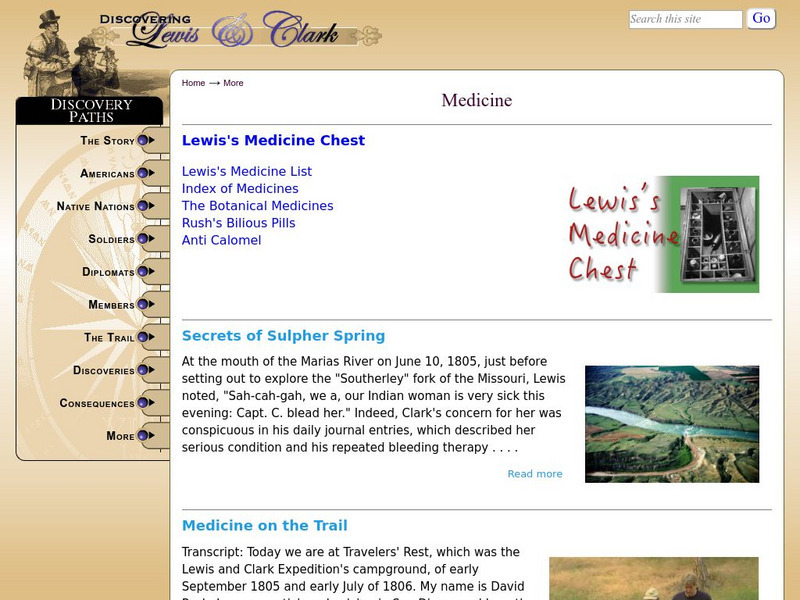Curated Video
Kenya aims for new rules to curb e waste
AP Television
Machakos, Kenya - 14 July 2014
1. Mid shot of hazardous electronic-waste warehouse workers dismantling computer CPUs
2. Close up of hazardous electronic-waste warehouse workers dismantling computer CPUs
3. Close up of...
TED-Ed
Periodic Videos
From hydrogen to ununoctium, this collection of videos has everything you need to begin teaching about the periodic table. Offering descriptions of each element and interesting experiments...
C-SPAN
On This Day: Friendship 7: John Glenn Orbits the Earth
Exactly what is the right stuff? Individuals consider the question using video clips about the astronaut legend, John Glenn. Footage includes NASA propaganda newsreels about his upbringing, as well as speeches from Glenn and his...
American Chemical Society
The Periodic Table Table
You'd be hard pressed to find someone more dedicated to the periodic table than Theodore Gray. A video lesson interviews him as he describes his passion and his creation. The installment of a larger series on reactions shows Gray's table...
PBS
The Sun and Planets
Do other planets experience night, day, and the seasons like humans do here on Earth? Examine planetary motion using real images of the planets through a simulation from PBS's Space lesson series. After observing the motion of each...
PBS
Mercury and Venus Transits
Mercury transits, crosses over the disk of the sun, approximately 13 times per century, while Venus transits 14 times per thousand years. View these extremely rare forms of eclipses in accelerated time as part of a series from PBS 9-12...
Crash Course
Alchemy: Crash Course History of Science #10
If the word alchemy makes you think of wizards gathered around bubbling cauldrons, you're not completely wrong! Introduce scholars to the history of chemistry during part 10 of a 15-part History of Science series. The video takes viewers...
Periodic Videos
Mercury
For many years, mercury was used in thermometers, dental fillings, and fluorescent lights. As scientists better understand the toxicity of this liquid metal, other materials replace these uses for mercury. Young scientists learn about...
Amoeba Sisters
Biomagnification and the Trouble with Toxins
Our relationship with toxins is, well, a little toxic. Explore how harmful substances work their way throughout the environment with a video from an expansive biology playlist. Topics include DDT and mercury, trophic levels, and water...
SciShow
What's It Like On Mercury?
Take a video tour of the planet Mercury. An installment of a solar system series explores the characteristics of Mercury. The presenter compares the planet to Earth by examining similarities and differences.
JFR Science
Pressure: How Does a Straw Work?
A straw is a simple thing ... with a much more complex explanation. Discover the molecular interactions that create pressure through a video from JFR Science. The resource demonstrates pressure in a variety of ways, then explains how and...
Crash Course
Mercury
The most elliptical orbit of any planet belongs to Mercury. The video includes obvious facts about Mercury such as the hot temperature and lack of magnetic field. It also discusses highly surprising facts such as the cracks, ice, and...
Fuse School
Minerals and Ores
Here's a video that will leave them wanting m"ore"! Part three of the seven-part series involving rocks and the rock cycle illustrates the relationship between minerals and ores. Young geologists get a look at how valuable metals are...
SciShow Kids
Explore the Solar System: The Rocky Planets
Take a trip to the rocky planets—Mercury, Venus, Earth, and Mars—with an engaging video that details their unique attributes.
SciShow Kids
Let's Make the Solar System
Get crafty with the help of pictures and a real-time demonstration from a video that details the step-by-step process in creating a paper solar system.
Bozeman Science
Water and Life
Learn about the wonders of water and why it is required for life. The resource contains a simulation to see how the molecules interact as a medium for metabolism.
Crash Course
Pollution
An environmental science video covers natural and synthetic compounds and the impact they have on the environment. It includes carbon, nitrogen, phosphorous, cyanide, mercury, sulfur, nitrogen dioxide, and endocrine disruptions.
Crash Course Kids
Weather in Space (The Rocky Planets)
Mercury, Venus, Earth, and Mars make up the solar system's inner planets. How are the weather patterns on these planets different from Earth's? This is the focus of a video that explains weather conditions on the inner planets.
Crash Course Kids
Seeing Stars
What are all those shiny things we see in the sky at night? It could be a star, planet, or asteroid! This is the focus of a video that helps viewers distinguish between these three objects in the sky.
Curated OER
Mercury
Visit the planet Mercury and learn about its orbit, place in the solar system, and difficult past. Closest to the sun and covered in craters, this planet has had it rough. You'll find out that Mercury is actually a dead planet but still...
Discovering Lewis & Clark
Discovering Lewis & Clark: Medicine on the Trail
A video interview with David Peck, D.O. and accompanying transcript examines wilderness medicine in the Lewis and Clark Expedition.
NASA
Nasa: Galleries: Video: What Is a Planet?
Explanation of the characteristics an object must have to be considered a planet. [7:53]
PBS
Pbs Learning Media: Crash Course Astronomy: Mercury
Mercury is the closest planet to the Sun. It has no atmosphere and is, as such, covered in craters. It's also incredibly hot but, surprisingly, has water ice hiding beneath its surface. [10:17]
University of Nottingham
Periodic Table of Videos: Mercury Bell
See the element mercury in solid form, frozen in the shape of a bell. Dr. Andrea Sella explains the process of making the bell and why he made it, while highlighting some important properties of mercury. [5:05]






















